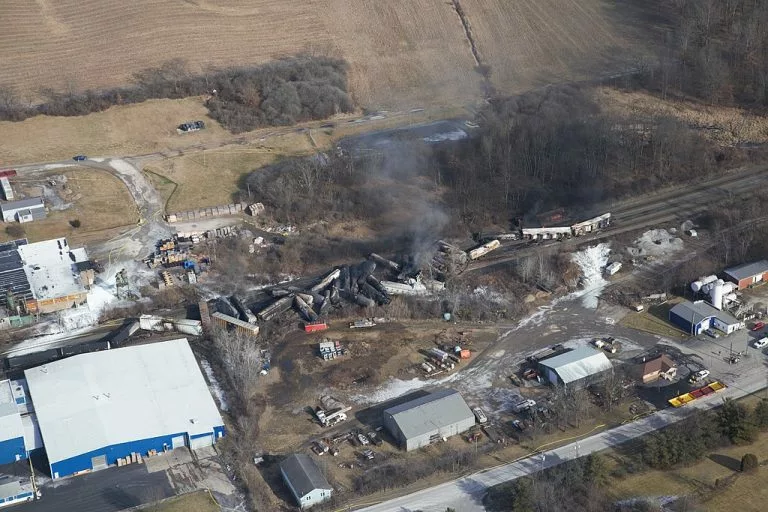The greatest enduring threat to the residents of East Palestine is contaminated groundwater. Fast remediation — and not empty political assurances — can solve the problem.

The director of Ohio’s Department of Health sought to assure East Palestine residents of their safety by remarking that the cancer-causing solvents from the derailment now in the town are no cause for concern, because these chemicals are already “a part of our everyday life.”
What a terribly callous, ignorant, thing for a health official to say. Just because there were some carcinogens in East Palestine before the train derailment does not excuse Norfolk Southern dumping tens of thousands of pounds more of them onto the small town. Plus—and the director should know this—where it comes to carcinogens, there is no such thing as a safe level. That means that every bit dumped by Norfolk adds to the town’s danger.
East Palestine residents, suddenly coping with a deluge of potential carcinogens, have good reason to be mistrustful if the director’s dismissive posture is truly his standard for safety. In the field of toxicology that the director seems to have ignored: “the dose makes the poison.” More carcinogen means more poison.
The fact that some of these chemicals may have existed in the town prior to the derailment doesn’t mean residents can safely handle the consumption or inhalation of even more of those chemicals. And no one knows with precision the level of chemical contamination that crosses the body’s cancer threshold and ignites the cancer process. This level varies by individual, and some — especially children, older people, or people with pre-existing conditions — are more vulnerable than others. So the necessary approach here is extensive remediation measures, not “nothing to see here” -style reassurances from public officials.
The Ohio EPA, in a 2019 assessment, has already described the East Palestine’s vulnerability to chemical contamination of its precious groundwater aquifers—which supply water in several ways to the entire town. The 2019 assessment concluded that the area’s public water source has “high susceptibility to contamination,” because the groundwater from which the public water is drawn is lacks “ a protective clay layer” above it, and because of the “presence of significant potential contamination sources in the protection area”. http://wwwapp.epa.ohio.gov/gis/swpa/OH1500912.pdf That means chemical contamination can seep into groundwater more quickly.
The spilled chemicals can potentially migrate rapidly down into the groundwater aquifers, via pipes, wells and highly-transmissible soil. Rain also pushes chemicals down through the soil into the aquifer. Once the chemicals are in the groundwater, they can get into the water supplies of area homes. And some of these chemicals will have no color or odor, and so residents will not necessarily know that the water they are drinking is contaminated, and dangerous.
East Palestine area homes are served by water from two sources: local public water supply, and private wells. The groundwater aquifers serving both is very shallow: reportedly only 52-98 below the ground for the public water system, and almost certainly much shallower than that for the private wells.
A frighteningly small quantity of chemical can damage a huge portion of the area’s aquifer: for example, just 20 pounds of a solvent like TCE or vinyl chloride, both of which were in the derailment spill, can contaminate millions of gallons of an aquifer. Therefore, it is vital that the chemicals not be allowed to reach the aquifer.
The following steps must be rapidly executed to restore safety of local water supplies, and the residents confidence in them:
These efforts will be costly and labor-intensive. But they will be far more effective than simply telling residents they should drink, cook, and bathe in bottled water — the current, thoughtless plan—and that they should not be bothered by even more carcinogens in their neighborhood, because some were there already. The threat to East Palestine’s water supplies can be remedied only with prompt action — not with empty, simplistic assurances from public officials.
Shawn Collins is an environmental attorney at The Collins Law Firm in Naperville, IL. He has secured clean water for thousands of clients whose water from their existing public well, or private water wells, was contaminated with dangerous chemicals.
